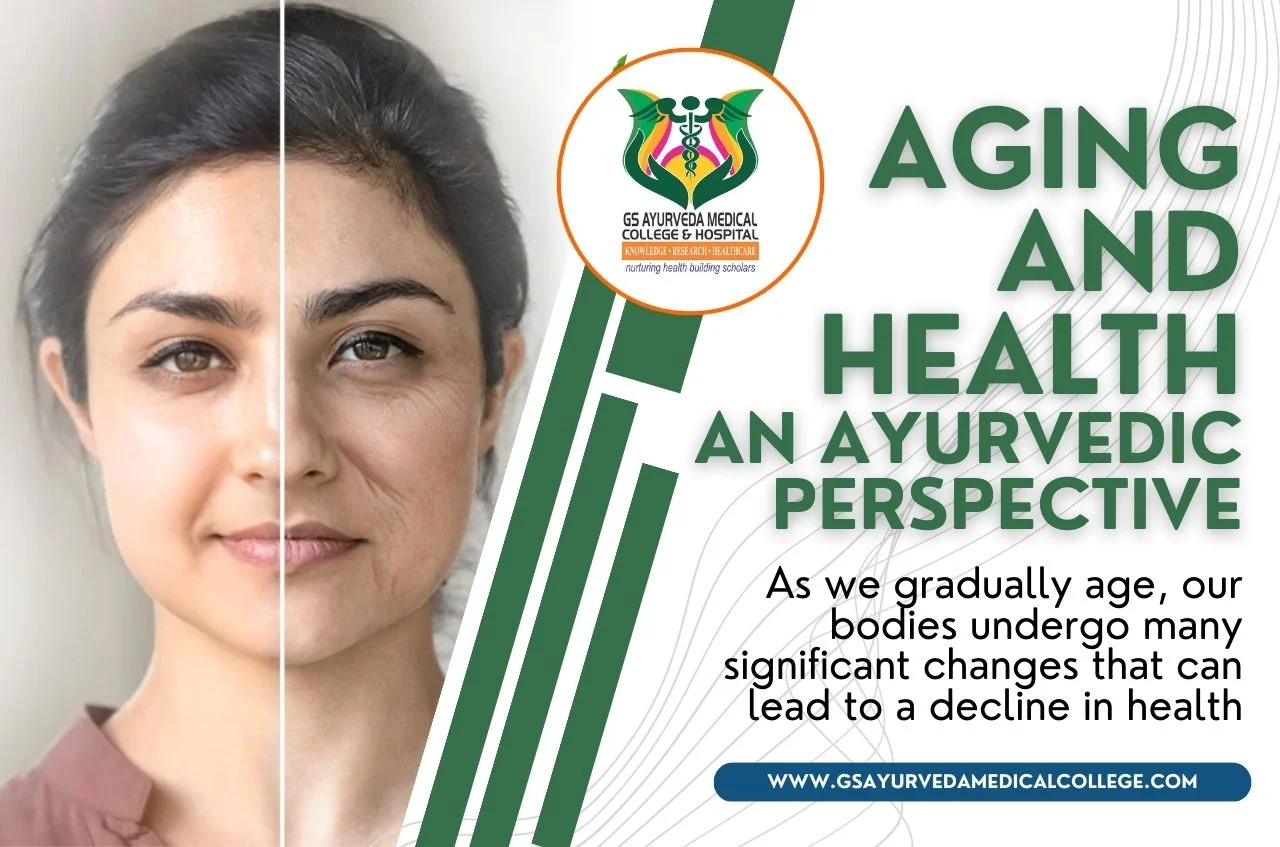
Aging and Health: An Ayurvedic Perspective
As we gradually age, our bodies undergo many significant changes that can lead to a decline in health. Ayurveda is an ancient science of medicine that has been long perceived in India, offering a unique perspective on aging and health.
According to Private Ayurvedic College in Uttar Pradesh, three principal bodily energies, or doshas, must stay balanced for optimum health: kapha, vata, and pitta. Our doshas can become imbalanced as we age, leading to physical and mental health problems.
Ayurveda offers several strategies for keeping the doshas balanced and maintaining good health as we age. These include dietary changes, lifestyle changes, and the use of herbal remedies.
What is Ayurveda?
Ayurveda is a holistic healing system that originated in India 5,000 years ago. This ancient science bases its beliefs on the connection between overall health and wellness and a balance between three doshas, or bodily energies: vata, pitta, and kapha. Vata is associated with movement and communication; pitta is associated with heat and metabolism; and kapha is associated with cohesion and stability.
For GS Ayurveda Medical College, Ayurveda is viewed as a healthy combination of physical, emotional, and spiritual wellness. Health is not about the absence of symptoms, but rather a state of balance and harmony with oneself and the environment. It views the body, mind, and spirit as interconnected. It addresses physical, emotional, and spiritual health through natural therapies such as diet, herbal remedies, yoga, massage, and meditation.
Ayurveda views aging as a natural process and offers many recommendations for aging gracefully and maintaining good health. This ancient art states that each dosha will be more or less prominent in different life stages and must be balanced through diet, lifestyle, and other therapies. Ayurveda also emphasizes the importance of regular self-care, a holistic approach to health, and preventive measures to maintain good health.
Ayurveda and Aging
Ayurveda provides numerous recommendations for elder care to maintain good health as one age. The Ayurvedic practitioners of Ayurvedic Medical Colleges in UP emphasize that the three doshas need to be balanced throughout all stages of life. As individuals age, vata dosha increases, putting them at risk for immune system decline, emotional disturbances, anxiety, and other age-related issues such as insomnia, memory loss, and susceptibility to colds.
Ayurveda recommends pacifying vata dosha through nourishing foods, gentle exercise, and daily self-care practices. Nourishing warm soups and stews and warm milk with ojas-increasing foods, such as nuts and dates, are recommended to soothe vata dosha. Herbal medicine and spices, such as saffron, fennel, cardamom, black pepper, nutmeg, and ginger, can balance the body. Ayurvedic self-care practices such as oil massage, steam baths, and meditations are also recommended for calming vata dosha and providing balance to the aging body.
The three Doshas
Ayurveda emphasizes maintaining balance amongst the three doshas— Vata (air), Pitta (fire), and Kapha (water) - throughout the life cycle. During old age, Pitta and Kapha remain relatively stable while vata increases due to reduced strength and increased dryness, coldness, and emotions. Therefore, Vata needs to be alleviated to maintain harmony in the body.
Vata has an air and space quality, and it usually becomes aggravated in autumn and winter when there is more dryness, coldness, and windy weather. Ayurvedic College in Uttar Pradesh regards that the pacification of Vata requires foods such as warm soups and stews, warm milk, and ojas-increasing foods like dates, nuts, honey, raisins, and almonds. Vata can also be balanced with herbal medicines and spices like saffron, cardamom, fennel, nutmeg, ginger, and black pepper.
Aside from nourishment, Ayurveda emphasizes the importance of self-care to enhance mental and physical health, such as oil massages, steam baths, meditation, and yoga. These activities help in calming vata and providing balance to the body.
Digestion and Aging
In Ayurveda, digestion is a vital part of overall health. Eating in rhythmic times, practicing mindfulness, and consuming food according to your unique dosha all play an essential role in good digestion.
As the body ages, weakened digestion and metabolism can lead to toxins accumulation and chronic diseases like diabetes, hypertension, and cancer. Thus, taking steps to improve digestion and ward off toxins is essential.
Ayurvedic methods to enhance digestion include:- Eating in regular time intervals.
- Chewing food thoroughly and slowly.
- Drinking warm water throughout the day.
- Avoiding overeating.
Herbal supplements such as Triphala, Ashwagandha, Amalaki, Guduchi, and Guggulu can also improve digestion in older age. These supplements are natural laxatives and help in the digestion of food.
In addition, yoga and meditation also play an essential role in maintaining balance among the three doshas. The practice of asanas, pranayama, and mudras helps improve digestion and nourish the body.
Sleep and Aging
According to an Ayurvedic perspective, sleep quality and quantity are integral for maintaining health, especially for aging people. Poor sleep is linked to depression, decreased immune function, and impaired mental performance.
At the same time, sleeping too much or in the wrong position can also lead to improper digestion and the formation of toxins.
To promote healthy sleep, Ayurveda prescribes certain practices, including taking long walks to exercise before bed, sleeping alone, and sleeping in the same position each night. It also recommends avoiding smartphones and other digital devices before bedtime.
Ayurveda suggests various herbs to help support regular sleep cycles, including Brahmi and ashwagandha. Practicing yoga and meditation can also be beneficial in promoting good sleep, and these two practices help center the body and promote mental health.
Sexuality and Aging
Sexual health is an essential aspect of holistic health that many people neglect, especially as they age.
According to Ayurveda, embracing our sexuality and actively participating in physical and emotionally intimate relationships can help improve overall well-being. This is especially true for aging people, as this can help promote healthy hormone balance and increase satisfaction and happiness.
Ayurveda recommends various practices to help promote healthy sexuality. These include planning particular times with a loved one when desired and engaging in mindful practices such as meditation and yoga before any sexual activity. Additionally, using aphrodisiac herbs such as ashwagandha and Shatavari can be an excellent boost for sexual health.
Emotional Health and Aging
The physical body isn’t the only aspect of health that can benefit from Ayurvedic practices for aging, and it is also essential to attend to emotional health.
Ayurveda suggests that we can deal with emotions in ways that make it easier to move through them. Such practices include:
- Journaling.
- Spending time in nature with family members or friends.
- Participating in creative activities, such as dancing, painting, or singing.
These activities can promote a sense of well-being while also helping identify the source of any emotional blockages. With practice, unresolved emotions can eventually be released, providing a more secure and harmonious inner landscape.
Conclusion
Private BAMS College in UP with fee structure, provides a holistic approach to help us achieve and maintain optimal health as we age. By focusing on the interconnectedness of mind, body, and spirit, Ayurveda can provide the following:- Practical solutions tailored to each individual.
- Considering their constitution.
- The present state of well-being.
- The various external influences that may be experienced in the present moment.
Taking a preventative approach and keeping body and emotions balanced is critical. Practically, this can involve managing a lifestyle, following a balanced diet, exercising regularly, and exploring any emotional blocks that may prevent us from fully embracing our aging process with positivity and grace.

